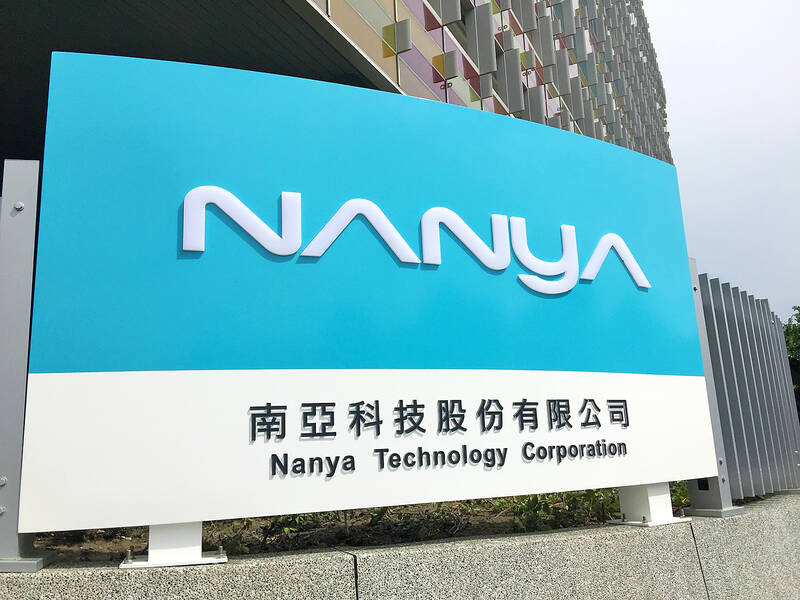DRAM chipmaker Nanya Technology Corp (南亞科技) yesterday posted wider-than-expected losses for last quarter, primarily due to weak end-market demand for PCs, smartphones and consumer electronics amid an economic slowdown and geopolitical conflicts.
The losses of NT$1.49 billion (US$46.3 million) in the July-to-September quarter deteriorated from losses of NT$814 million in the previous quarter and marked the eighth quarterly loss in a row, company data showed. Earnings per share worsened to minus- NT$0.48 last quarter.
While the average selling prices of the company’s products climbed about 5 percent, Nanya Technology’s shipments and revenue plummeted 22 percent and 18 percent respectively last quarter from the previous quarter, it said.

Photo: Grace Hung, Taipei Times
“Artificial intelligence [AI] was the only segment enjoying booming demand. Demand for PCs, mobile phones and consumer electronics fell short of our exceptions, because of weakness in certain major economies,” Nanya Technology president Lee Pei-ing (李培瑛) said.
More than 60 percent of the world’s DRAM market remains in the doldrums, as servers only consume just over 30 percent of DRAM chips, Lee said.
Nanya Technology’s bottom line last quarter was also dragged by losses of NT$475 million stemming from power outages, foreign exchange losses of NT$324 million and an increase of NT$140 million in research expenses, the company said.
To turn around its business, Nanya Technology is gearing up for the production of DDR5 memory chips for AI devices later this year, Lee said.
DDR5 chips enjoy a price premium of 30 to 50 percent compared with DDR4 chips, along with better cost efficiency, Lee said, adding that the company expects the new chips to account for 15 percent of its total DRAM production.
Nanay Technology holds a lukewarm outlook for this quarter, as the wars in Ukraine and the Middle East, as well as high inventories in the market remain worrisome, although demand may improve slightly from last quarter, thanks to holiday season demand in the US and Europe, Lee said.
As the industry’s top makers continue boosting production of DDR4 chips to vie for bigger market shares, they might need two more quarters to digest inventories, Nanya Technology said.
Nanya Technology yesterday cut its capital spending for this year to NT$20 billion from an earlier budget of NT$26 billion, citing delays in equipment delivery.

Taiwan Semiconductor Manufacturing Co (TSMC, 台積電) secured a record 70.2 percent share of the global foundry business in the second quarter, up from 67.6 percent the previous quarter, and continued widening its lead over second-placed Samsung Electronics Co, TrendForce Corp (集邦科技) said on Monday. TSMC posted US$30.24 billion in sales in the April-to-June period, up 18.5 percent from the previous quarter, driven by major smartphone customers entering their ramp-up cycle and robust demand for artificial intelligence chips, laptops and PCs, which boosted wafer shipments and average selling prices, TrendForce said in a report. Samsung’s sales also grew in the second quarter, up

On Tuesday, US President Donald Trump weighed in on a pressing national issue: The rebranding of a restaurant chain. Last week, Cracker Barrel, a Tennessee company whose nationwide locations lean heavily on a cozy, old-timey aesthetic — “rocking chairs on the porch, a warm fire in the hearth, peg games on the table” — announced it was updating its logo. Uncle Herschel, the man who once appeared next to the letters with a barrel, was gone. It sparked ire on the right, with Donald Trump Jr leading a charge against the rebranding: “WTF is wrong with Cracker Barrel?!” Later, Trump Sr weighed

HEADWINDS: Upfront investment is unavoidable in the merger, but cost savings would materialize over time, TS Financial Holding Co president Welch Lin said TS Financial Holding Co (台新新光金控) said it would take about two years before the benefits of its merger with Shin Kong Financial Holding Co (新光金控) become evident, as the group prioritizes the consolidation of its major subsidiaries. “The group’s priority is to complete the consolidation of different subsidiaries,” Welch Lin (林維俊), president of the nation’s fourth-largest financial conglomerate by assets, told reporters during its first earnings briefing since the merger took effect on July 24. The asset management units are scheduled to merge in November, followed by life insurance in January next year and securities operations in April, Lin said. Banking integration,

LOOPHOLES: The move is to end a break that was aiding foreign producers without any similar benefit for US manufacturers, the US Department of Commerce said US President Donald Trump’s administration would make it harder for Samsung Electronics Co and SK Hynix Inc to ship critical equipment to their chipmaking operations in China, dealing a potential blow to the companies’ production in the world’s largest semiconductor market. The US Department of Commerce in a notice published on Friday said that it was revoking waivers for Samsung and SK Hynix to use US technologies in their Chinese operations. The companies had been operating in China under regulations that allow them to import chipmaking equipment without applying for a new license each time. The move would revise what is known